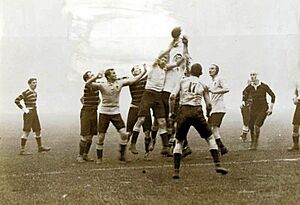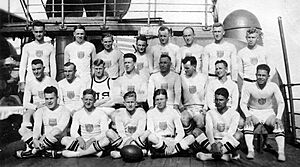Rugby union at the Summer Olympics facts for kids
Quick facts for kids Rugby union at the Summer Olympics |
|
|---|---|
 |
|
| Governing body | WR |
| Events | 2 (men: 1; women: 1) |
| Games | |
|
|
|
|
Rugby union was once a medal sport for men at the modern Summer Olympic Games. It was played at four of the first seven Olympic competitions. The sport first appeared at the 1900 Paris Games, where the host country, France, won the gold medal. Rugby was then featured again at the London Games in 1908, the Antwerp Games in 1920, and the Paris Games in 1924.
Soon after the 1924 Games, the International Olympic Committee (IOC) decided to remove rugby union from the Olympics. Since then, many attempts have been made to bring the sport back. In October 2009, the IOC voted to include the sevens version of the game in the 2016 Summer Olympics in Rio de Janeiro. Rugby sevens first appeared in an Olympic program at the 2014 Summer Youth Olympics.
Contents
How Rugby Joined the Olympics
The sport was brought into the Olympics by Pierre de Coubertin. He is famous for restarting the modern Olympic Games. Coubertin also helped rugby grow in France. He even refereed the first French club championship game in 1892. He also refereed France's first international rugby match in 1906. Coubertin created the IOC in 1894, but rugby union did not appear until the second Olympic Games.
Paris 1900
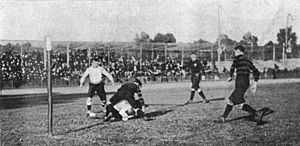
Three countries entered teams for the 1900 Games: France, Germany, and Great Britain. The teams were not exactly like today's national teams. For example, a club team called Moseley Wanderers RFC represented Great Britain.
The rules were also a bit different back then. For example, a "try" was worth three points, not five as it is today. A "drop goal" was worth four points, not three. Also, a "goal from mark" was worth four points. This rule was later removed in 1977.
France won the gold medal. They beat Great Britain 27 to 8 and Germany 27 to 17. About 6,000 people watched the game between France and Great Britain. This was the biggest crowd at those Games. One player on the French team, Constantin Henriquez, was from Haiti. He was the first known person of color to compete in the Olympic Games. Because of this, the IOC later said France's medal was won by a Mixed team.
London 1908
Rugby union was not played at the 1904 Games or the 1906 Intercalated Games. But it was back in 1908, when the Olympics were held in England. England is where rugby started.
Three teams were supposed to play: Australasia (Australia and New Zealand), France, and Great Britain. However, France pulled out before the games started. This left only two teams. Australasia was represented by the Wallabies, who were already touring Britain. Great Britain was represented by the Cornwall county team. This choice was a bit debated, as the Wallabies had already beaten Cornwall.
As expected, Australasia defeated Great Britain, winning the gold medal 32 to 3. The game was played in bad weather, with fog and a slippery field. Two players from the Australian team later won other Olympic medals. Danny Carroll won another rugby gold with the United States in 1920. Sydney Middleton won a gold medal in rowing at the 1912 Games. Rugby was not played at the 1912 Games. The sport was also not planned for the 1916 Summer Olympics, which were canceled because of World War I.
Antwerp 1920
A plan to send an American team to the 1920 Games in Antwerp began in California. This happened after a Berkeley rugby team had a successful tour in 1920. The United States Olympic Committee (USOC) allowed them to enter. The team was made up of players from Stanford, Berkeley, and Santa Clara. Danny Carroll, the 1908 champion, was a player-coach for the team.
When the U.S. team arrived in Antwerp, the Czech and Romanian teams had withdrawn. The English rugby union also declined to send a team. This was to avoid problems with the start of their own season. So, only France and the United States were left to play.
Their match was played in the rain in front of about 20,000 fans. The U.S. team, with many players new to rugby, surprised everyone by winning 8 to 0. All their points were scored in the second half. One U.S. team member, Morris Kirksey, won two more medals at these Games. He won silver in the 100 meters dash and gold in the 4 × 100 meters relay.
Paris 1924
Rugby was included again in the 1924 Games in Paris. The USOC decided to send a team again. The host nation, France, and Romania also entered. The American team was mostly made up of players from California. They traveled to England by ocean liner from New York City.
France defeated Romania 59-3 and were seen as the favorites for the final game. The gold medal game was played on May 18 in front of 30,000 spectators. During the final, French fans booed the American team. Some French fans also threw things onto the field. There were also fights in the stands. One American reserve player was hurt.
The Americans won the gold medal by 17-3. After the game, French fans rushed onto the field. Police and French players had to protect the Americans. During the medal ceremony, the American national anthem was hard to hear because of the booing. The American team had to be escorted to their locker room by police.
Old video footage of the 1924 Gold Medal match is in the rugby documentary, A Giant Awakens: the Rise of American Rugby.
Why Rugby Was Removed
The crowd trouble during and after the 1924 Olympic Final gave rugby a bad image. Also, it was hard to get enough teams to make the competition fair. The Olympics also wanted to add more individual and women's events. Plus, Pierre de Coubertin, a big supporter of rugby, stepped down as head of the Olympic Movement in 1925. All these reasons led to rugby being dropped from the Olympics. In 1928, the IOC said no to a request to have rugby at the Amsterdam Games.
An exhibition tournament was held at the 1936 Berlin Games. France, Germany, Italy, and Romania competed. France beat Germany 19 to 14 in the final. This was the last rugby union match played at the Olympics until 2021.
In 1976, 22 African countries and Guyana asked for New Zealand to be banned from the Olympics in Montreal. This was because a New Zealand rugby team was touring South Africa. South Africa had been banned from the Olympics since 1964 due to its apartheid policies. Since rugby union was no longer an Olympic sport, the IOC did not ban New Zealand. Because of this, the 23 nations boycotted the 1976 Olympics.
Efforts to Bring Rugby Back
Fifteens
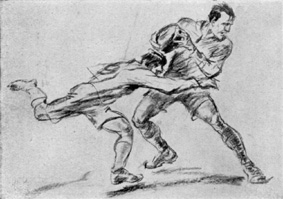
Countries like Italy in 1960, the Soviet Union in 1980, and South Korea in 1988 asked for rugby union to be brought back. The 1980 request was not approved. The 1988 Games almost saw rugby return, with support from the International Rugby Football Board (now called World Rugby or WR).
The IRB did not focus much on getting rugby back into the Olympics until the early 1990s. Then, they started having informal meetings with the British Olympic Association. In 1994, when Vernon Pugh became Chairman of the IRB, the serious effort to rejoin the Olympics began. Pugh believed that being part of the Olympics would help rugby. Many European rugby groups were already part of their country's Olympic committees. More rugby nations from Africa, Asia, Oceania, and the Americas joined the IRB. They saw rugby as a sport that could win medals for smaller nations. This increased the demand to get rugby back into the Olympics.
A big step happened in November 1994, when the IRB was officially recognized by the IOC. At that event, IOC President Juan Antonio Samaranch said that rugby's history and values fit well with the Olympic spirit. This meeting led to the IRB attending annual IOC meetings. It also led to rugby being considered for future Olympic Games. In 2002, a plan was made to include rugby sevens, golf, and the Chinese martial art of wushu.
Sevens
- For more information, see Rugby sevens at the Summer Olympics#Efforts to include rugby sevens in the Olympics
Men's Rugby Results
Results
| Year | Host | Gold medal game | Bronze medal game | ||||
|---|---|---|---|---|---|---|---|
| Gold | Score | Silver | Bronze | Score | 4th place | ||
| 1900 Details |
Paris |
France (Mixed team) |
Germany Great Britain |
three nations entered | |||
| 1908 Details |
London |
Australasia |
32–3 | Great Britain |
two nations entered | ||
| 1920 Details |
Antwerp |
United States |
8–0 | France |
two nations entered | ||
| 1924 Details |
Paris |
United States |
17–3 | France |
Romania |
three nations entered | |
Participating Nations
| Nation | 00 | 08 | 20 | 24 | Years |
|---|---|---|---|---|---|
| – | – | – | |||
| – | – | ||||
| – | – | – | |||
| – | – | ||||
| – | – | – | |||
| – | – | ||||
| – | – | – | |||
| Total nations | 3 | 2 | 2 | 3 |
Medal Table
This table shows the medals won up to the end of the 1924 Olympics.
| Rank | Nation | Gold | Silver | Bronze | Total |
|---|---|---|---|---|---|
| 1 | 2 | 0 | 0 | 2 | |
| 2 | 1 | 0 | 0 | 1 | |
| 1 | 0 | 0 | 1 | ||
| 4 | 0 | 2 | 0 | 2 | |
| 0 | 2 | 0 | 2 | ||
| 6 | 0 | 1 | 0 | 1 | |
| 7 | 0 | 0 | 1 | 1 | |
| Totals (7 entries) | 4 | 5 | 1 | 10 | |
Updated: 1924 Summer Olympics
Notable Rugby Players in the Olympics
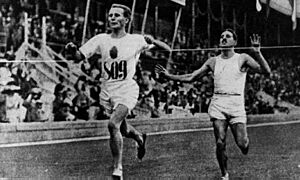
Many famous people in other sports were also notable rugby players. These include:
- Pierre de Coubertin: He founded the modern Olympics. He was a big rugby fan and even refereed the first French rugby championship final in 1892.
- Jean Bouin: Played rugby for France and competed in track events.
- Eric Liddell: Played rugby for Scotland and was famous for track events.
- Heather Moyse: Played for the Canadian women's rugby team and won gold in Olympic bobsleigh.
- James Cecil Parke: Played rugby for Ireland and competed in track events. He also played cricket, golf, and tennis at Wimbledon and in the Davis Cup.
- Noel Purcell: Played rugby for Ireland and won gold in Olympic water polo. He was the first Olympic athlete to represent two countries.
- Jacques Rogge: Was an international rugby player for Belgium and later became the president of the IOC.
- Constantin Henriquez: A Haitian rugby player who won gold for France.
- Danny Crates: A notable Paralympian who has carried the Olympic torch twice. He also plays competitive rugby.
- Kevin O'Flanagan: An international rugby player for Ireland. He represented Ireland on the International Olympic Committee.
- Victor Costello: Competed for Ireland in shot put at the 1992 Games. He then played 39 times for the Ireland rugby union team.
Olympic Rugby Venues
| Games | City | Stadium | Capacity | Ref. |
|---|---|---|---|---|
| Paris | Vélodrome de Vincennes | not listed | ||
| London | White City Stadium | 97,000 | ||
| Antwerp | Olympisch Stadion | 12,771 | ||
| Paris | Stade de Colombes | 22,737 |
See also
 In Spanish: Rugby en los Juegos Olímpicos para niños
In Spanish: Rugby en los Juegos Olímpicos para niños
 | Chris Smalls |
 | Fred Hampton |
 | Ralph Abernathy |


